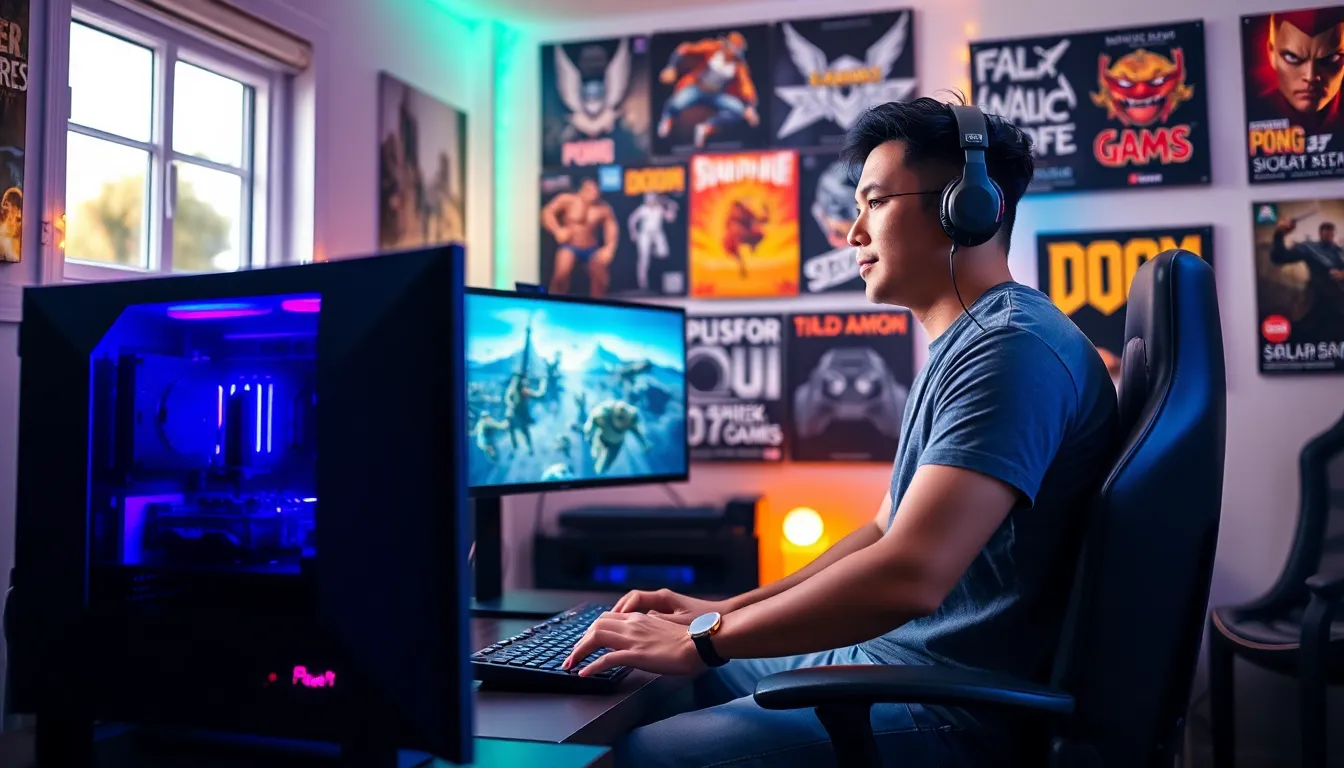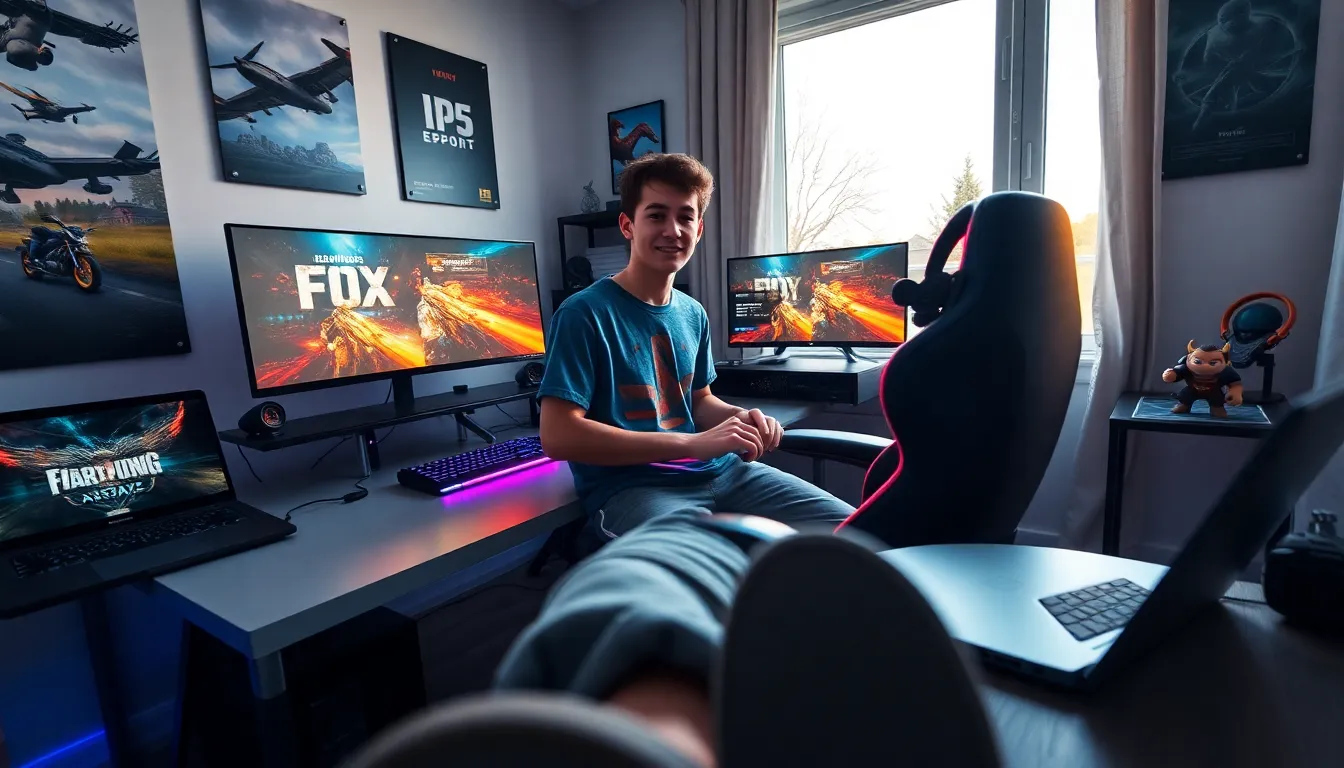In the vast expanse of digital entertainment, PC gaming stands out as a beacon of innovation and community. With a history that spans decades, it has evolved significantly from its humble beginnings into a multi-billion dollar industry that captivates millions across the globe. This article delves into the evolution of PC gaming, its competitive landscape, the intricacies of building the ultimate gaming setup, effective gaming practices, and the importance of community engagement in this passionate universe.
Table of Contents
ToggleThe Evolution Of PC Gaming

Key Milestones In PC Gaming History
PC gaming has come a long way since its inception. The journey began in the 1970s with simple games like “Pong” and “Space Invaders”, which were primarily arcade experiences. By the 1980s, gaming found its way into homes, with PCs becoming more accessible to the average consumer. Notable milestones include the release of the IBM PC in 1981, which standardized PC hardware and allowed games to flourish.
The early 90s marked a significant turning point with the introduction of 3D graphics, as seen in games like “Doom” and “Wolfenstein 3D”. These titles not only revolutionized gameplay mechanics but also set the stage for future innovations. By the late 90s and early 2000s, PC gaming was becoming increasingly mainstream with multiplayer capabilities, thanks to the rise of the internet, leading to the popularization of games such as “Counter-Strike”.
As technology advanced, so did gaming experiences. The introduction of VR and ray tracing technology today can be traced back to these formative years, showcasing the constant push for improved graphics and immersive gameplay.
Impact Of Hardware Advancements
The evolution of hardware played a pivotal role in shaping the PC gaming landscape. Early PCs relied on basic components that limited gaming experiences. But, as graphics cards and CPUs became more powerful, capabilities expanded. For instance, the launch of NVIDIA’s 3Dfx Voodoo in the late 90s marked a significant advancement in graphics technology, allowing games to present richer environments.
In recent years, innovations such as solid-state drives (SSDs) and high refresh-rate monitors have transformed gameplay, providing smooth experiences and faster load times. The ongoing development of hardware continues to redefine the boundaries of PC gaming, making it essential for gamers to stay updated with the latest tech to enhance their play.
The Rise Of Competitive Gaming
Esports: A New Era Of Entertainment
Competitive gaming, commonly referred to as esports, has emerged as a dominant force in the entertainment industry. With millions of viewers tuning in to watch professional gamers compete, platforms like Twitch and YouTube Gaming have revolutionized the way audiences engage with their favorite titles. Esports has become more than just a hobby: for many, it’s a viable career path, supported by sponsorships, endorsements, and prize money that can reach into the millions.
Major events such as The International for Dota 2 and the League of Legends World Championship have solidified esports as a legitimate front in entertainment, attracting fans from all over the world. With expanded viewership, esports has begun to penetrate mainstream sports culture, leading to discussions of Olympic inclusion and high school esports programs.
The community surrounding esports fosters a sense of belonging, with fans rallying behind their favorite teams and players, further driving the growth of gaming as a spectator sport.
Popular Competitive Games And Genres
Several genres have thrived in competitive gaming, each with its own unique contributions to the landscape. First-person shooters (FPS) like Counter-Strike: Global Offensive and Call of Duty have dominated the competitive scene for years, thanks to their fast-paced action and team strategy. Multiplayer online battle arena (MOBA) games such as League of Legends have also carved a niche, emphasizing teamwork and tactical gameplay.
Real-time strategy (RTS) games, although less mainstream today, have left a lasting legacy in competitive gaming with titles like StarCraft II and Age of Empires. Also, the rise of battle royale games such as PUBG and Fortnite opened new avenues for competition and community building, attracting both casual players and dedicated competitors alike.
Building The Ultimate Gaming PC
Essential Components And Their Role
Crafting the perfect gaming PC requires a solid understanding of essential components and their functions. The CPU (central processing unit) is often referred to as the brain of the computer, influencing how well games perform. Pairing it with a robust GPU (graphics processing unit) is crucial, as it handles rendering graphics and frames, impacting visual quality and frame rates.
Adding in RAM (Random Access Memory) helps in multitasking, allowing players to run multiple applications without experiencing lag. Storage solutions also matter: SSDs provide faster load times and an overall smoother experience compared to traditional hard drives.
Cooling systems, power supplies, and motherboards are equally important, ensuring stability and performance. Understanding the synergy between these components can help gamers optimize their systems for smooth operations.
Budgeting For Your Gaming Setup
Setting up an ideal gaming environment also involves careful budgeting. Costs can vary greatly based on individual needs and preferences, but a balanced approach is essential for both performance and financial viability. Establish a budget that factors in components, peripherals (like monitors and keyboards), and additional accessories, allowing for gradual upgrades over time.
Purchasing adequate power within budgetary constraints may mean prioritizing certain components over others. Gamers should conduct thorough research to identify what is deemed as essential versus what can wait for a later upgrade. With strategies like building pcs from available parts or purchasing refurbished hardware, anyone can create a satisfying gaming setup without very costly.
Effective Gaming Practices
Optimizing Performance And Visuals
To enhance the gaming experience, optimization is vital. Adjusting in-game settings can drastically improve frame rates and visuals. Lowering graphic detail can result in smoother gameplay, which is particularly important in competitive gaming where every millisecond counts.
Beyond in-game settings, optimizing system performance is crucial. Regularly updating graphic drivers and ensuring that background applications are closed can help free up resources for gaming. Employing performance monitoring tools can provide insights on where improvements can be made, ensuring an overall smoother experience without compromising visual fidelity.
The Importance Of Community Engagement
Connecting With Other Gamers Online
The gaming world thrives on community engagement. Connecting with fellow gamers often enriches the experience, providing opportunities to collaborate, compete, and share insights. Online platforms such as Discord and various gaming forums foster communities where gamers can discuss strategies, share content, and seek advice on various topics.
Participating in these communities can lead to friendships, partnerships in gaming, and even valuable networking opportunities within the industry. Gamers often find solace in collective experiences, offering support to each other through shared challenges and victories.
Navigating Online Communities And Forums
Navigating online gaming communities and forums requires a level of etiquette. Understanding the culture of a community can enhance interactions and experiences. Many forums have specific guidelines to ensure respectful discourse, promoting constructive criticism instead of toxicity. Engaging positively in these platforms can lead to lasting connections and contributions that uplift the gaming community as a whole.
Conclusion
The realm of PC gaming continues to evolve, reflecting technological advancements and the changing landscape of entertainment. From its historical milestones to the current rise of competitive gaming and the significance of community engagement, it presents a multifaceted experience for gamers. As technology propels the industry forward, embracing effective gaming practices and staying connected within the community remain pivotal. The journey of a gamer is shaped not only by the games played but also by the interactions and relationships forged along the way, making the world of PC gaming a continually enriching experience.






